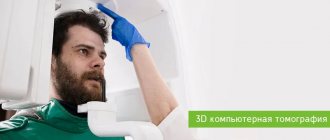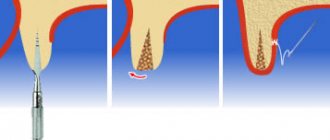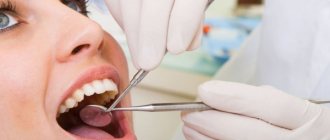Any surgical intervention is serious and the implantation of artificial tooth roots is no exception. The procedure requires attentiveness and concentration not only from the attending physician, but also from the patient. Proper preparation will reduce the likelihood of unpleasant and undesirable consequences. Detailed tips and recommendations will help you understand what you need to know before dental implantation, how to behave and what to prepare for.
Initial appointment and consultation before dental implantation
At the first appointment, a competent specialist can interview the patient and conduct an initial diagnosis. It is very important from the very beginning to find out about the patient’s health status, the presence of chronic diseases or conditions in the acute stage, and be sure to obtain all the information about the medications taken.
In the questionnaire that patients fill out before surgery, it is necessary to honestly answer questions and indicate chronic pathologies, as well as allergies, if any.
These data will influence the choice of treatment tactics and the drugs used, in particular the choice of anesthetic.
In some cases, the doctor may prescribe an additional examination in the form of a general blood test.
Why is it important? Because many diseases and borderline health conditions affect metabolism, and this in turn affects the healing process, which is the most important stage in implantation. Future prosthetics and the service life of crowns depend on the engraftment of the titanium root.
Diagnosis of cataracts
Modern equipment makes it possible to detect disturbances in the structure of the lens even at the initial stages of cataract development. Also, the patient himself should notice characteristic signs - narrowing of the visual field, loss of light sensitivity, visual clouding of the intraocular media, interfering with good vision. Cataracts most often develop in older people, along with other pathologies of the visual tract, especially presbyopia, a natural age-related farsightedness.
The main method for diagnosing cataracts is biomicroscopy, which involves examining the ocular media at multiple magnification under a special slit lamp. Such an examination allows you to determine the size and degree of cataracts, make predictions regarding the speed of spread of the process and the urgency of the operation.
It is also important to determine the degree of visual acuity, the preservation of the peripheral vision field, and to examine the fundus of the eye for changes in the neurovascular structures of the eye. An appointment with an ophthalmologist after 40 years of age must be accompanied by tonometry - measuring intraocular pressure to diagnose glaucoma.
Optical coherence tomography is a method for accurately determining the state of preservation of intraocular structures. Next, modeling and selection of a suitable intraocular lens are used.
Why do you need to get tested?
Based on the state of the blood, you can objectively assess the actual state of the body and calculate possible risks during surgical procedures. Taking tests helps the doctor confirm possible assumptions about common diagnoses or notice something new that may affect the course of the operation.
There are various types of blood or urine tests that can help identify dangerous pathologies for the body. For example, the level of AST and ALT enzymes may indicate cardiovascular diseases and a previous heart attack. Any surgical interventions are contraindicated within 6 months after myocardial infarction.
For women, it is important to pay attention to thyroid hormone levels and parathyroid hormone, as they reflect the activity of calcium metabolism. Based on these tests, it can be concluded that osteoporosis is present. Often, implantation is not indicated for this disease due to deterioration of the bone tissue.
Another important indicator is blood sugar level. Values greater than 10 mmol/l suggest the presence of diabetes mellitus. For people with a confirmed diagnosis, glucose values should also not exceed 10 mmol/l, because this disease affects the implant’s healing and increases the risk of its rejection and the occurrence of an inadequate immune system response.
In addition to blood counts, doctors prescribe tests to detect various infections. This is important for both the patient and the doctor to ensure the safety of the surgical procedure for all involved. Chronic infections distort the immune response and can cause complications.
In what other cases can surgical intervention be postponed?
Carious teeth are not the only source of infection in the oral cavity. The dentist may also detect other pathologies in which endoprosthetics, arthrodesis, arthroplasty, and replacement of an intervertebral disc with an implant are strictly prohibited. They are united by a high probability of penetration of pathogenic microorganisms into the joints or spine during the rehabilitation period. During the process of growth and reproduction, infectious agents release toxic products of their vital activity into the surrounding space. They are the cause of the development of acute inflammation with the formation of purulent exudate. What, in addition to caries, is a contraindication to surgery:
- periodontitis is an inflammatory pathology that affects the tissue surrounding the tooth with subsequent destruction of the ligamentous apparatus of the tooth and part of the jaw bone. When the body's defenses are weakened, it is often complicated by an abscess, suppuration, and fistulas;
- gingivitis is an inflammatory process of the gum mucosa. In a chronic, recurrent course, periodontitis develops, followed by exposure of the necks of the teeth, their loosening and loss.
Another infectious source in the oral cavity is intense plaque. It is a concentration of living and dead microorganisms, toxic products of their growth and reproduction. Before surgery on the joints and spine, tartar must also be removed. This is a hardened plaque that forms on the surface of the enamel. It consists of food debris, dead cells, bacteria, phosphorus, iron and calcium salts.
Mandatory tests
The doctor individually informs each patient what tests are taken before implantation, which are indicated for all patients at risk. For healthy patients, X-ray diagnosis is often sufficient, provided there are no chronic diseases.
Below is a list of tests that a specialist prescribes without fail:
- General blood analysis
- General urine analysis
- Blood chemistry
- Blood sugar test (included in biochemistry)
- ESR
- HIV
- Syphilis
- Hepatitis B, C
- Rh factor, blood group
The list changes at the discretion of the doctor depending on the patient’s health. Based on the results of the research, the specialist may delay the operation.
Relative contraindications to implantation include:
- Exacerbations of chronic diseases
- Exacerbation of infectious diseases
- Increased blood sugar
- Myocardial infarction less than 6 months before surgery
- Hormonal disorders
- The need for bone grafting (to be decided individually, in some cases it is possible to do bone grafting and implantation in one visit)
- Pregnancy and lactation
- Lack of oral sanitation
- Taking medications that affect blood pressure, blood clotting, etc.
Among these factors, the doctor also makes an individual decision about the possibility of surgery.
There are a number of contraindications that completely exclude surgical intervention.
Absolute contraindications:
- Hemophilia
- Presence of malignant tumors
- Mental illness
- Allergy to anesthetics
- Diabetes mellitus type 1
- Immune system disorders
- Severe pathologies of the cardiovascular system
For all conditions, there is a certain list of tests and corresponding symptoms, according to which the surgeon determines to delay implantation or even choose a different tactic for treating the patient.
What to do before surgery
Almost every second person hears this phrase: “We need to have an operation.” This is life - diseases find our body and bring physical suffering, and we bring them to the doctor. More than one hundred and sixty years ago, the first patient flew to the kingdom of Morpheus under the supervision of a physician and returned back - on October 16, 1846, dentist Thomas Morton performed an official operation under anesthesia. Today I will tell you how to minimize the risk of surgery without risking your health.
Saying
Having been practicing in anesthesiology for more than ten years, I have rarely seen a patient who was specially preparing for surgery. Yes, there are patients who lead a healthy lifestyle, and they are always ready to withstand some unusual physical and non-physiological stress on the body with relative ease. But there are few of them; more often we come across clients with several chronic diseases who poison their bodies with bad habits. And suddenly one fine day they decided to change something in their physical shell (we do not treat the soul). They consult a doctor, who determines the indications, excludes contraindications and sets a date for hospitalization. Well, this is good, let them be operated on as planned, rather than being brought in on an emergency call with a full stomach, wild pain and drunk.
Next I will contact you personally. God forbid, of course, that you have to seek our help, so let everything be pretend, like in kindergarten - I’m a doctor, you’re a patient.
Let's play doctor
We will not talk about emergency surgical interventions; nothing depends on you here. So - you have time. A week, a month, even two to think about it before a planned operation - and what do you do? In the best case, undergo examinations prescribed by a specialist. But usually, you don’t do anything, then just come to the hospital, where they examine you and operate on you. You are completely at the mercy of the doctor and medical staff. Well, like - here I am, as I am, a kind of gift, and you are obliged to cure me. I must say, in this case, you are right - our task is to ensure that you are discharged with at least positive dynamics. But you must understand that a lot depends on your participation.
It's like being with a beautiful girl. Imagine that the patient is a girl and the doctor is a guy. Purely hypothetically. He has been seeking her reciprocity for three months now, she doesn’t seem to mind, but she doesn’t let him either. The guy was already tired, the fuse began to pass. The girl, seeing this matter, went for intimacy. He overextended himself, but she is cold, lies and waits for it to end. She thinks, “I gave him a gift,” and he thinks, “Damn, what a log.” Moreover, as a result of unsafe sex, a complication arose - she became pregnant. Happens? Of course it happens. He burned out, the love passed, but like a normal guy, he will have to get married. Everyone is disappointed. The girl and the guy got an unhappy marriage.
It’s the same in the operating room - those three months, these are three days before the operation, during which they did not have time to properly prepare the patient, sex - the operation. Due to smoking and uncorrected hypertension, we suffered bronchospasm during the operation, the body stopped receiving enough oxygen, one complication developed into another - and now there was a hemorrhagic stroke. Marriage is when a doctor was ordered by a court to pay monthly alimony to relatives. Everyone is disappointed.
What am I talking about? And in order not to disappoint either the guy with long dynamos and boring sex with consequences, or the doctor with unpreparedness for surgical treatment and complications, you need to prepare yourself for... well, at least for surgery.
Where to begin?
The first is desire, even so - DESIRE!!! A strong desire to get rid of the disease. They didn’t just lead you by the hand, but you yourself wanted to come and have the operation. So that you look forward to this day, like the day of getting rid of an illness. We understood that it would be better later. Only this attitude will be correct. It has long been noted that a person in critical condition without the desire to survive is likely to “play the box.” And the wild desire for life works wonders.
The second is to get examined and decide on the possibility of surgery at all. You may need to undergo a course of treatment before you are allowed to go under the knife. This is normal, we must be sure of the success of the operation.
So, everything is fine, your internal organs are in a compensated state and the outpatient doctor suggests going to the hospital in a week.
You have a whole week.
What can you do in a week?
Control your blood pressure levels
It is no secret that patients with uncontrolled hypertension are more likely to experience high blood pressure during spinal anesthesia and have a higher risk of stroke and heart attack after general anesthesia.
Measure your weight
Calculate your body mass index. I strongly recommend that obese people lose a couple of kilograms.
Body mass index is calculated using the formula:
,
Where:
- m - body weight in kilograms
- h - height in meters,
and is measured in kg/m².
For example, a person’s mass = 85 kg, height = 164 cm. Therefore, BMI = 85: (1.64 × 1.64) = 31.6. An index of 18-25 is considered the norm.
Lose weight not only through diet - a complete refusal of food will not lead to anything good. There will be a breakdown of one’s own muscle tissue, a decrease in the protein pool, increased catabolism, which means tissue healing will be difficult, possibly even with purulent complications, since the immune system will also suffer.
A diet low in fat and carbohydrates, high in protein, and movement are recommended. If possible, run. No? Then walk a lot. This way you will lose extra pounds, increase the endurance of the heart muscle to overload, and improve the respiratory function of the lungs.
Avoid psychological overload! It is not forbidden to take sedatives. And it is mandatory to take the medications that your doctor prescribes.
About smoking
Give up bad habits. Ideally - completely, but it is also possible for a while before surgery. It is not my task to teach you to quit smoking - there are many manuals on this topic, tons of waste paper has been written, millions of bytes have been crammed into the Internet.
Ideally, according to recent research, you need to quit smoking two weeks before the upcoming surgery. It is during this period that the oxygen capacity of the blood is restored, almost equal to that of non-smokers, and the lung tissue is cleansed.
Are you having trouble quitting smoking? Well, the only thing I can reassure you with is that smokers recover nerve cells better after clinical death. But smoke lovers still have a higher chance of getting it during and after surgery.
About alcohol
It’s better not to use it at all this week. Well, maybe sip a glass of red wine or a shot glass at lunch or before bed.
I am not a supporter of completely giving up alcohol; I believe that it is better to sleep peacefully after an evening glass of wine than to suffer from insomnia all night and develop hypertension. But I warn drunkards - surgical intervention is stressful, often alcoholics in the postoperative period produce severe delirious visions. And I have never seen such a client enjoy them. These visions force a person to act, defend himself, run away, cause additional harm to his body, and how many such madmen cause problems for the staff! In my presence, naked “Ophiuchus” men ran away from the department, threw bottles, and hid under the bed from the shaggy creatures. And one, lying in the trauma department, played snowballs with guess what? It was lucky, those who had a hand injury ran away, and those who were fixed to the bed, it was really scary for them. Such patients have to be firmly fixed and their brains clouded with narcotic drugs.
Speaking of drug addicts - this applies to a greater extent to those who use hard drugs - no one will take you to the operating table with withdrawal symptoms.
About veins
Take care of your veins! Leave a good vein for the operation; do not inject it or take blood for analysis. During surgery, let this vein work for you. In any case, we will find the vessel, but we will get our hands dirty, and we may have to look for the central vein, which is fraught with complications.
And I’ll tell you a secret - you can grow veins! No, new ones will not appear, but they will increase in diameter, which will make their puncture possible. Any physical activity on the arms increases the filling of the blood vessels of the upper extremities. Pull-ups, push-ups, even working with a wrist expander will help increase their volume.
By following these recommendations, you can at least calmly say to yourself: “I did my best.” Believe me, this is a lot!
Be healthy!
Vladimir Shpinev
Photo thinkstockphotos.com
Additional tests
Additional studies are ordered by a specialist to ensure that the current conditions for implantation are acceptable.
List of optional studies:
- Enzymes AST, ALT and others
- Thyroid hormones
- Coagulogram
- Leukocyte formula
- Cholesterol
- Total blood protein
- ECG
At his discretion, the doctor prescribes additional tests before dental implantation based on the patient’s survey data. This is necessary to eliminate the risk of complications.
Rehabilitation stages
When carrying out reorganization, it is necessary to determine all its stages. Below is an approximate step-by-step plan:
- Appointment with a doctor. At this stage, the dentist performs a visual inspection and at the same time identifies all the measures necessary for sanitation.
- General photograph of the teeth. This image should not only cover individual or diseased areas of the teeth, but also all tissues, as well as the entire masticatory-jaw apparatus. Therefore, it is best to use a 3 D image.
- Professional oral cleaning.
- Treatment plan. For this, the help of other specialists, for example, a surgeon, orthopedist or orthodontist, can be used.
- Own treatment. This stage is inconvenient because it takes a lot of time.
- Final measures. Sometimes in this case the patient is registered for medical examination.
- Doctor's report. This stage involves a long-term work schedule, as well as preventive inspections.
- Visit the clinic and follow all points of the plan.
Tips before dental implantation
In order to prepare for surgery, the patient must follow the doctor's recommendations. They are aimed at stabilizing the body and reducing stress factors that can affect the outcome of the operation.
Most often, the surgeon recommends:
- Do not overwork the day before surgery
- Eliminate smoking
- Do not drink alcoholic beverages
- Do not take blood thinning medications on the eve of surgery (depending on the dosage, it is possible to exclude their first dose in the morning before the procedure)
It is very important to plan the day and time of the operation so as to minimize disruption to your regular medication regimen. Sometimes preparation requires consultation with the patient’s attending physician, most often this concerns a cardiologist, endocrinologist and neurologist.
The drugs prescribed by these specialists affect blood vessels, hormonal levels, the general condition of the body and the activity of the nervous system, so it is important to obtain a doctor’s approval for surgery and new recommendations for taking medications.
3D planning for dental implant installation
The results of a CT scan and other measurements of the jaw are entered into a special computer program to visually reconstruct the jaw.
The implantologist calculates the location for the implants and draws up a detailed surgical plan. In difficult situations, the doctor models the jaw visually and then creates a 3D model of the patient’s jaw (using a 3D printer). The model is made of special plastic that imitates the jaw with the patient’s bone density. Using a lithographic model, the implantologist reproduces the operation, studies the structure of the jaw and the nuances of installing implants.











